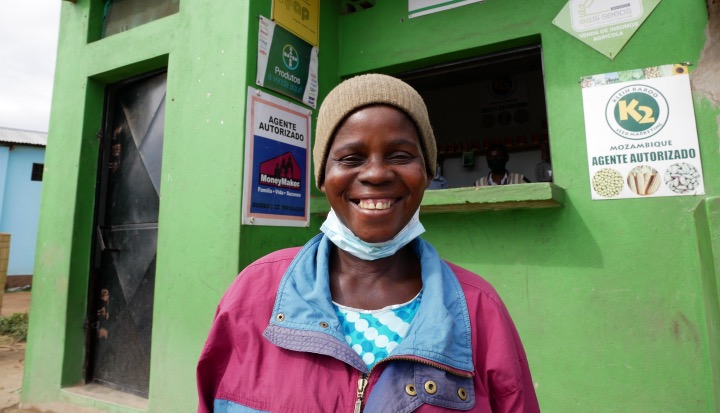Based on evidence and experience, iDE is dramatically expanding its work with women entrepreneurs.
Flora Mostiço is a change agent in her community. The mother of six sells affordable agricultural supplies, including high-quality seeds, fertilizers and water pumps, at her market shop in Mozambique’s Beira Corridor. Despite repeated cyclones that ravaged the region five years ago, he also runs a successful farm, employing workers to help with the harvest.
At the same time, he gives free business advice and shows other farmers how to spray their crops to prevent pests from destroying them. “I started with something small and now I’m growing,” Flora said of her business. Many are now following her lead as a role model for other up and coming business women.
As a last mile female entrepreneur, Flora represents what she believes is one of the most effective and just ways to fight poverty. A large body of evidence shows that micro and small enterprises run by women are key drivers of prosperity in low- and middle-income communities.
according to Report of the Food and Agriculture Organization of the United NationsProjects that contribute to women’s empowerment by increasing their decision-making power over income and/or resources are also significantly more effective in increasing household income, dietary diversity, food security, and resilience to shocks and stresses than projects that do not focus on women’s empowerment.
Specifically, the results show that the number of people who see a significant gain in income increases by 5 percentage points, and the number of people who see a significant gain in resilience increases by 20 percentage points.
In her case, Flora has come a long way from previous years when she and her family lived on a low income. “I was a man walking around with nothing,” says Flora.
But with training International Development Institutions (iDE) and other market actors who also support rural entrepreneurs Flora became a “farm business consultant”, learned about high-yielding, climate-resilient agricultural techniques; track expenses; and, with iDE’s support, established a business relationship with a large commercial supplier that carries its goods.
By improving local value chains and applying new technical know-how, Flora helps increase the prosperity and well-being of hundreds of smallholder farmers who buy its products, receive its training and business support, and follow its example to successfully plant and harvest. crops, building resilience to climate change and combating progressive poverty.
While her accomplishments are remarkable, Flora’s humble beginnings are hardly surprising. It is known that women and girls are more likely to experience poverty than men and boys. This “feminization” of poverty manifests itself in many forms, with women being worse off in terms of access to credit, land ownership and the effects of climate change.
For example, women are underrepresented in the labor economy. The World Economic Forum Global Gender Gap Report 2023 says that women have re-entered the labor force at higher rates than men globally since the pandemic, but the gap between men and women in the labor force remains wide overall. The lowest level of participation parity is in the Middle East, North Africa and South Asia.
But a growing movement in the international development sector recognizes women as key to change rather than as victims. For example, it is in Canada “feminist international aid politics” supports targeted investments, partnerships, innovation and advocacy efforts to close the gender gap. At the same time, CARE, a global NGO, is implementing a major financial inclusion program dedicated to creating sustainable development. And the Cherie Blair Foundation recently announced it was expanding its work around women’s business opportunities.
Based on evidence and over 40 years of fieldwork, iDE decided to dramatically expand its work with women entrepreneurs and their clients. We believe that despite the challenges, business women drive economic progress, create employment opportunities, reduce poverty and raise living standards, both outside themselves and in their communities.
We currently work across Africa, Asia and Latin America, where we identify the most effective types of entrepreneurs and develop user journeys, map the barriers women face, and create action plans to systematically remove these barriers and empower them towards prosperity. This comprehensive approach ensures that we do no harm as we help build sustainable market ecosystems for community development.
Back at the market in Mozambique, Flora moves towards her shop. As he passes fruit and clothing stalls, people in the crowd call out to say hello. He is well known here and respected by other local farmers. “I have to help my clients because they can’t do without,” he says. “Together we must see change in our society.”
John Choptiany leads iDE’s global technical programming across our climate, sustainability, agriculture, WASH, nutrition and design sectors. With expertise in climate resilience, renewable energy and environmental management, John provides iDE project teams with technical assistance on these topics and acts as a champion for iDE’s efforts on how our projects can address the climate change and development nexus. robust market ecosystems to enable communities to thrive. John has a strong interdisciplinary academic background and practical experience at the intersections of development theory and field implementation. John received a PhD in environmental science and engineering and a master’s degree in resource and environmental management from Dalhousie University. He was the lead author of six scientific publications and co-author of five other articles.
John ChoptianyApplications, Vice President, iDE

